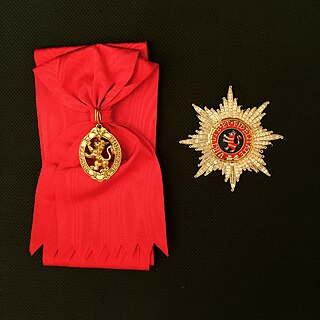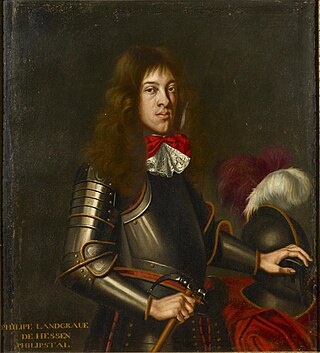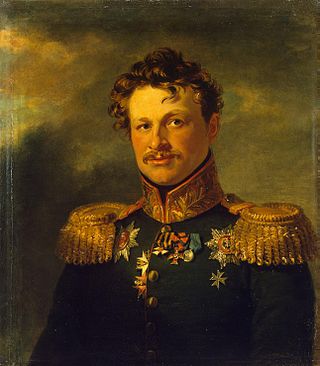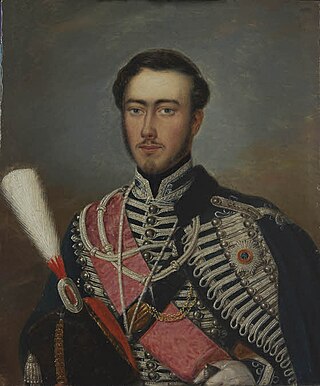
This article is about the history of Hesse. Hesse is a state in Germany.

The House of Hesse is a European dynasty, directly descended from the House of Brabant. They ruled the region of Hesse, one branch as prince-electors until 1866, and another branch as grand dukes until 1918.

Georg Wilhelm, Prince of Schaumburg-Lippe was a Count and later Prince of Schaumburg-Lippe.

The House Order of the Golden Lion was an order of the German Landgraviate and Electorate of Hesse-Kassel and later, the Grand Duchy of Hesse and by Rhine. It was first instituted in 1770 by Landgrave Frederick II, in honour of and under the patronage of Saint Elizabeth of Hungary, an ancestor of the House of Hesse, and was intended to award auspicious merit.

Wilhelm VI, Landgrave of Hesse-Kassel, known as William the Just, was Landgrave of Hesse-Kassel from 1637 to 1663.

Philip of Hesse-Philippsthal was the son of William VI, Landgrave of Hesse-Kassel and Hedwig Sophia of Brandenburg. He was the first landgrave of Hesse-Philippsthal from 1663 to 1721 and the founder of the fifth branch of the house of Hesse.

Ludwig Wilhelm, Prince of Bentheim and Steinfurt was a Royal Hanoverian and Prussian Lieutenant General and the Prince of Bentheim and Steinfurt from 3 November 1866 to 28 September 1890.

William of Hesse-Philippsthal was a member of the House of Hesse and Landgrave of Hesse-Philippsthal from 1770 until his death.
Charles II of Hesse-Philippsthal was a member of the House of Hesse and was Landgrave of Hesse-Philippsthal from 1849 until 1866.

Ernest Constantine was Landgrave of Hesse-Philippsthal from 1816 until his death.

Adolph, Landgrave of Hesse-Philippsthal-Barchfeld was a member of the House of Hesse. He was the ruling Landgrave of Hesse-Philippsthal-Barchfeld from 1777 until his death.

The Electorate of Hesse, also known as Hesse-Kassel or Kurhessen, was a state whose prince was given the right to elect the Emperor by the Imperial diet in 1803. When the Holy Roman Empire was abolished in 1806, its prince, William I, chose to retain the title of Elector, even though there was no longer an Emperor to elect. In 1807, with the Treaties of Tilsit, the area was annexed to the Kingdom of Westphalia, but in 1814, the Congress of Vienna restored the electorate.

Alexis William Ernest Philip of Hesse-Philippsthal-Barchfeld was the last ruling Landgrave of Hesse-Philippsthal-Barchfeld.

Princess Wilhelmina Louise Christine of Saxe-Meiningen was a Duchess of Saxe-Meiningen by birth and by marriage Landgravine of Hesse-Philippsthal-Barchfeld.

Landgrave Charles August Ludwig Philip of Hesse-Philippsthal-Barchfeld was a member of the House of Hesse and was the ruling Landgrave of Hesse-Philippsthal-Barchfeld from 1803 to 1806 and from 1813 until his death.

Princess Maria of Hanau and Hořowitz was a German aristocrat.

Chlodwig, Landgrave of Hesse-Philippsthal-Barchfeld was an officer in the Prussian Army and head of the Hesse-Philippsthal line of the House of Hesse.

William of Hesse-Philippsthal-Barchfeld, was a German prince of the Hesse-Philippsthal-Barchfeld branch of the House of Hesse, and Konteradmiral of the Prussian and Imperial German Navy.

Ernst von Hessen-Philippsthal-Barchfeld was a member of the German House of Hesse and a military officer of the Imperial Russian Army.

Marie of Württemberg (1818-1888) was daughter of the Duke of Württemberg and Landgravine of Hesse-Philippsthal in her own right.
This page is based on this
Wikipedia article Text is available under the
CC BY-SA 4.0 license; additional terms may apply.
Images, videos and audio are available under their respective licenses.


















